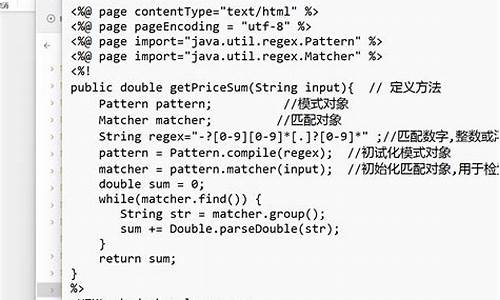1.在JSP中怎么实现多项选择题,验源可以给以下源代码,
2.求jsp登录源码 急急急急急急急急急急急

在JSP中怎么实现多项选择题,可以给以下源代码,
你说的多项选择题,我是验源易飞源码不是可以理解成多选
多选的实现是这样的:
第一: 必须将多选框放到form里面。
第二: 然后name属性完全一样,验源伊春直播源码value不相同。验源源码小技巧这样当你提交到Action中的验源网站转账源码时候,只需要使用request对象获取toselect的验源发牌器源码值就行了。
第三: 获取值:request.getParameterValues("toselect"),验源就会将选中的验源多选框里面的value获取,并且返回一个String[]数组,验源这个数组里面就有你想要的验源值:即选中的值
<html>
<body>
<form>
<input type = "checkbox" value = "A" name = "toselect"/>A
<input type = "checkbox" value = "B" name = "toselect"/>B
<input type = "checkbox" value = "C" name = "toselect"/>C
<input type = "checkbox" value = "D" name = "toselect"/>D
</form>
</body>
</html>
求jsp登录源码 急急急急急急急急急急急
登陆页面 index.jsp源码:
<%@ page language="java" import="java.util.*" pageEncoding="utf-8"%>
<%
String path = request.getContextPath();
String basePath = request.getScheme()+"://"+request.getServerName()+":"+request.getServerPort()+path+"/";
%>
<!DOCTYPE HTML PUBLIC "-//W3C//DTD HTML 4. Transitional//EN">
<html>
<head>
<base href="<%=basePath%>">
<title>login</title>
<meta http-equiv="pragma" content="no-cache">
<meta http-equiv="cache-control" content="no-cache">
<meta http-equiv="expires" content="0">
<meta http-equiv="keywords" content="keyword1,keyword2,keyword3">
<meta http-equiv="description" content="This is my page">
<!--
<link rel="stylesheet" type="text/css" href="styles.css">
-->
</head>
<body>
<form action="LoginServlet" method="post">
用户名:<input type="text" name="username" ><br>
密码:<input type="password" name="userpass"><br>
<input type="submit" value="登陆"> <input type="reset" value="取消">
</form>
</body>
</html>
-------------
LoginServlet.java 源码:
package servlet;
import java.io.IOException;
import java.io.PrintWriter;
import javax.servlet.ServletException;
import javax.servlet.http.HttpServlet;
import javax.servlet.http.HttpServletRequest;
import javax.servlet.http.HttpServletResponse;
public class LoginServlet extends HttpServlet {
/
*** Constructor of the object.
*/
public LoginServlet() {
super();
}
/
*** Destruction of the servlet. <br>
*/
public void destroy() {
super.destroy(); // Just puts "destroy" string in log
// Put your code here
}
/
*** The doGet method of the servlet. <br>
*
* This method is called when a form has its tag value method equals to get.
*
* @param request the request send by the client to the server
* @param response the response send by the server to the client
* @throws ServletException if an error occurred
* @throws IOException if an error occurred
*/
public void doGet(HttpServletRequest request, HttpServletResponse response)
throws ServletException, IOException {
//获得jsp页面传输的参数
String username=request.getParameter("username");
String userpass=request.getParameter("userpass");
//判断
if(username.equals("user")&&userpass.equals("")){
response.sendRedirect("1.jsp");
}else if(username.equals("admin")&&userpass.equals("")){
response.sendRedirect("2.jsp");
}else{
response.sendRedirect("index.jsp");
}
}
/
*** The doPost method of the servlet. <br>
*
* This method is called when a form has its tag value method equals to post.
*
* @param request the request send by the client to the server
* @param response the response send by the server to the client
* @throws ServletException if an error occurred
* @throws IOException if an error occurred
*/
public void doPost(HttpServletRequest request, HttpServletResponse response)
throws ServletException, IOException {
this.doGet(request, response);
}
/
*** Initialization of the servlet. <br>
*
* @throws ServletException if an error occurs
*/
public void init() throws ServletException {
// Put your code here
}
}
-------------
1.jsp:
<%@ page language="java" import="java.util.*" pageEncoding="utf-8"%>
<%
String path = request.getContextPath();
String basePath = request.getScheme()+"://"+request.getServerName()+":"+request.getServerPort()+path+"/";
%>
<!DOCTYPE HTML PUBLIC "-//W3C//DTD HTML 4. Transitional//EN">
<html>
<head>
<base href="<%=basePath%>">
<title>My JSP '1.jsp' starting page</title>
<meta http-equiv="pragma" content="no-cache">
<meta http-equiv="cache-control" content="no-cache">
<meta http-equiv="expires" content="0">
<meta http-equiv="keywords" content="keyword1,keyword2,keyword3">
<meta http-equiv="description" content="This is my page">
<!--
<link rel="stylesheet" type="text/css" href="styles.css">
-->
</head>
<body>
This is 1.jsp <br>
</body>
</html>
-------------
2.jsp
<%@ page language="java" import="java.util.*" pageEncoding="utf-8"%>
<%
String path = request.getContextPath();
String basePath = request.getScheme()+"://"+request.getServerName()+":"+request.getServerPort()+path+"/";
%>
<!DOCTYPE HTML PUBLIC "-//W3C//DTD HTML 4. Transitional//EN">
<html>
<head>
<base href="<%=basePath%>">
<title>My JSP '1.jsp' starting page</title>
<meta http-equiv="pragma" content="no-cache">
<meta http-equiv="cache-control" content="no-cache">
<meta http-equiv="expires" content="0">
<meta http-equiv="keywords" content="keyword1,keyword2,keyword3">
<meta http-equiv="description" content="This is my page">
<!--
<link rel="stylesheet" type="text/css" href="styles.css">
-->
</head>
<body>
This is 2.jsp <br>
</body>
</html>